|
|
|
Sort Order |
|
|
|
Items / Page
|
|
|
|
|
|
|
| Srl | Item |
| 1 |
ID:
124399
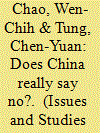

|
|
|
|
|
| Publication |
2013.
|
| Summary/Abstract |
From 2002, the Chinese government insisted that it would not give in to international pressure to change the renminbi (RMB) exchange rate regime. The main question asked in this paper is whether the Chinese government did resist this pressure from early 2002 to mid-2008. Judging from Chinese official documents, records released after bilateral meetings between the United States and China, testimony given by U.S. officials in the U.S. Congress, Chinese government policy statements, and measures related to the RMB exchange rate, we conclude that, in addition to economic and domestic factors, China's exchange rate policy was indeed influenced by American political pressure, and that this pressure led to reform of the RMB exchange rate regime and the widening of the floating band of the RMB exchange rate.
|
|
|
|
|
|
|
|
|
|
|
|
|
|
|
|
| 2 |
ID:
124407
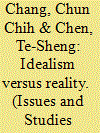

|
|
|
|
|
| Publication |
2013.
|
| Summary/Abstract |
Using data from the fifth wave 0/ the World Values Survey, this study analyzes the origins of postmaterialism and how it might affect people s support for environmental protection on the two sides of the Taiwan Strait. Our empirical results show that the level of postmaterialism in China is no less than it is in Taiwan. Age and education are two essential predictors for postmaterialism at the level of individual analysis. Middle class intellectuals in China are more concerned about postmaterialist issues than their counterparts in Taiwan. In addition, we .find that the Chinese demonstrate higher levels of support for environmental protection than the Taiwanese do, whereas Chinese postmaterialists are less likely to be concerned about the environment than Taiwanese postmaterialists. Therefore, we suggest a revised version of Inglehart's hypotheses to explain support for environmental protection. The paper underlines the effect of political institutions on shaping cultural values, in contrast previous studies that give too much weight to economic development
|
|
|
|
|
|
|
|
|
|
|
|
|
|
|
|
| 3 |
ID:
124405
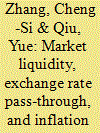

|
|
|
|
|
| Publication |
2013.
|
| Summary/Abstract |
This paper examines the effects of market liquidity and exchange rate pass-through on domestic inflation in China from 1998 to 2008 using both univariate and multivariate dynamic models. We find the following: (1) market liquidity in China has significantly positive effects on inflation, (2) the pass-through effect of exchange rates is limited to CPI. (3) the shock to growth rate of real GDP drives domestic inflation significantly, (4) external shocks contribute little to the volatility of inflation, and (5) China s central bank should keep the growth rate of M2 as the main monetary policy instrument in inflation management.
|
|
|
|
|
|
|
|
|
|
|
|
|
|
|
|
| 4 |
ID:
124403


|
|
|
|
|
| Summary/Abstract |
This article critically examines the policy capacity crisis in post- 1997 Hong Kong. In particular, it provides a framework that allows for a more sophisticated analysis of new social movements (NSMs) and their role in challenging the government in policy making and implementation. A number of studies examining recent campaigns conducted by NSMs reveal that the social activists involved have distinctive goals, organizational structures, and political styles, and that the distinctiveness of NSMs has challenged the traditional ways in which public policy has been made, which emphasized rationality, scientific analysis, and policy coherence. However, this article argues that the policy capacity crisis cannot be explained purely in terms of the rise of NSMs. The form and strength of their challenge to policy capacity can only be fully understood in relation to the prevailing political structures which define the connected set of political opportunities/constraints facing the protest groups. In particular MSMs only become relevant in mobilizing and intensifying antagonistic forces when their values and actions are mediated by the structure of political opportunities. Moreover, any effect on government policy derived from confrontational action also has to be mediated by the political structures. In short, the structural opportunities/constraints enshrined in particular policy areas are equally, if not more, significant than the internal dynamics of NSMs in understanding the impact of such movements on public policy. Hence, there is no real reason to assert that the rise of NSMs necessarily poses a considerable challenge to the policy capacity of the Hong Kong government.
|
|
|
|
|
|
|
|
|
|
|
|
|
|
|
|
| 5 |
ID:
124402
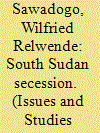

|
|
|
|
|
| Publication |
2013.
|
| Summary/Abstract |
The political landscape of Sudan, the former largest country of Africa in terms of territory, has witnessed a dramatic change with the January 2011 referendum in South Sudan followed by the official division of the country into two separate independent entities on July 9, 2011, thereby sealing the fate of North and South Sudan. Such a situation presents crucial challenges not only to warring forces in war-driven Darfur but also to major foreign investors such as China; hence the relevance of this paper that seeks to first provide an in-depth analysis of the role of Sudan in Beijing s foreign policy prior to South Sudan s secession before examining the implications that South Sudan s secession might have on the one hand, on the Darfurian political stance towards the Al-Bashir regime and, on the other hand, on Chinese strategic policy options vis-à-vis the region.
|
|
|
|
|
|
|
|
|
|
|
|
|
|
|
|
| 6 |
ID:
124400
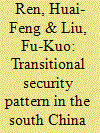

|
|
|
|
|
| Publication |
2013.
|
| Summary/Abstract |
The South China Sea (SCS) is an area of strategic value to the surrounding countries and also to some outsiders. For that reason the SCS issue is now becoming a major problem affecting regional security. In recent year, the overall situation in the SCS region has remained stable, but there are still some uncertain factors that may have an impact on regional security. Since the end of the Cold War, some external parties, such as the United States, Japan, and India, have focused their attention on Southeast Asia and strengthened their political, economic, and military relations with some members of the Association of Southeast Asian Nations (ASEAN) With this development, the regional security pattern has entered a period of transition. China is trapped in a security dilemma in the SCS, and China's behavior there will be a litmus test for Beijing s claim that its rise to the status of a regional and global power will be a peaceful one.
|
|
|
|
|
|
|
|
|
|
|
|
|
|
|
|
|
|
|
|
|